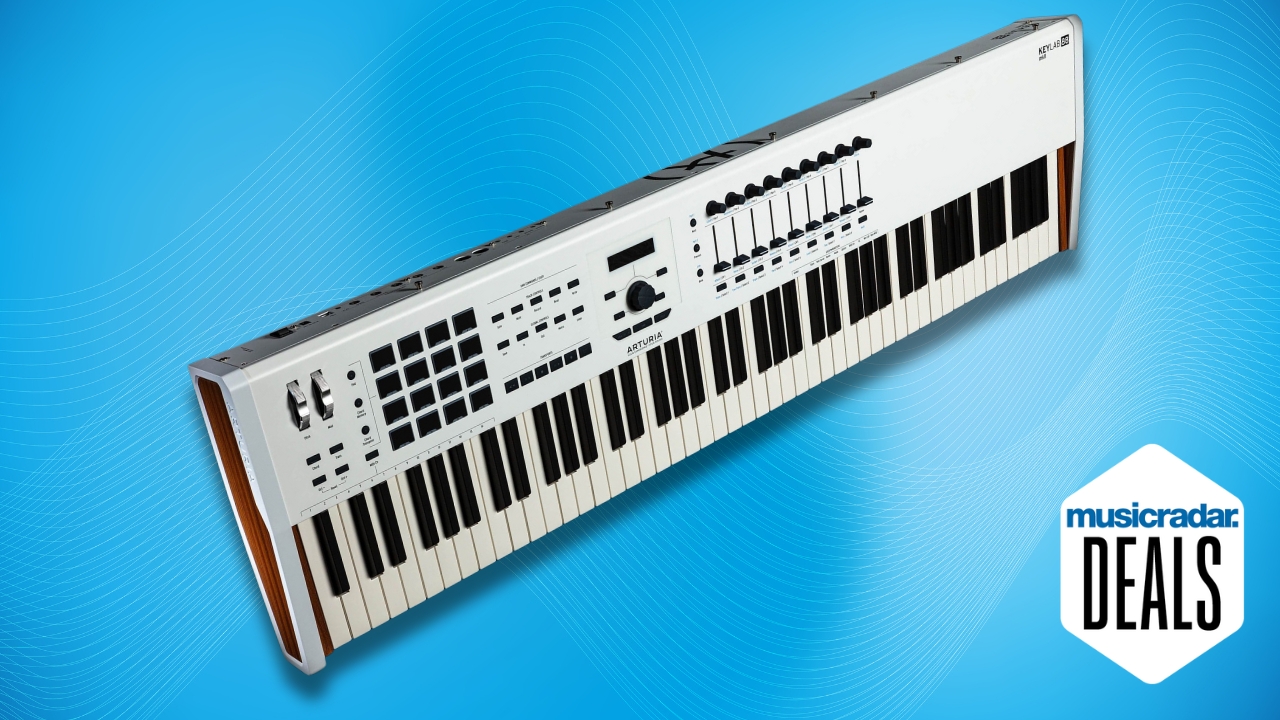Slipknot's VMan: “My approach isn’t the same as Paul’s. I can’t be him and never will be”
Going from six-strings to four for one of the world’s most coveted metal bass gigs
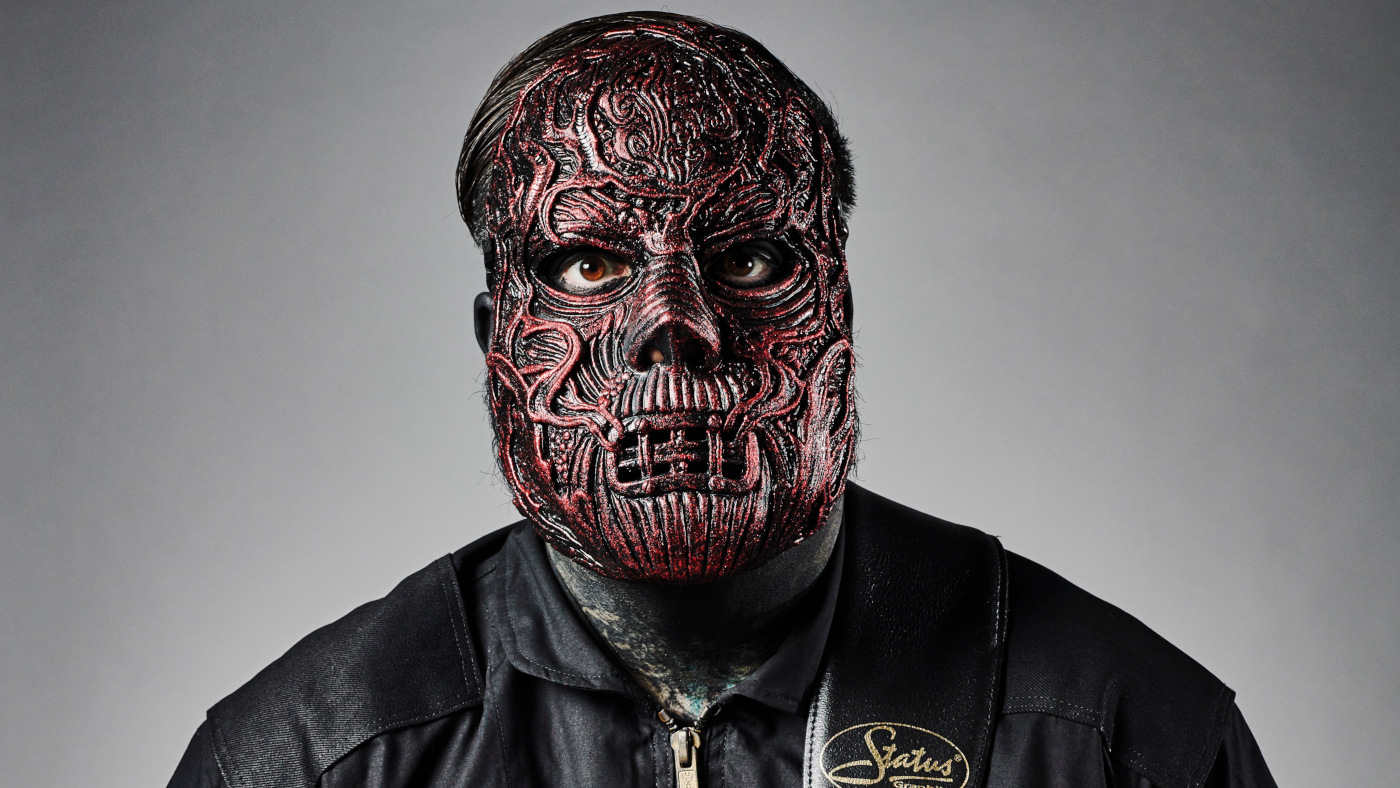
Jetsetting across the world in the biggest metal group of its generation, Slipknot’s Alessandro ‘VMan’ Venturella welcomes us into the madness he’s been part for the last five years...
At a secret rehearsal facility in the UK Midlands, where roadies and assistants are busying the corridors in final preparations for Slipknot’s European tour, bassist Alessandro ‘VMan’ Venturella is looking primed for victory.
Masked up, in a black boiler suit, he switches on the green lights of his favoured Status Graphite bass guitar to full beam and starts tearing into the instrument with the same aggression that landed him one of the most highly coveted metal gigs in recent history.
I said something to the effect that I could do whatever he needed from me. Then I just had to make sure it was true!
Since joining the American giants in 2014, the English musician has only performed on main stages and in arenas as the headline act – it’s a lifestyle that goes hand-in-hand with being among the biggest and best in an ever-flourishing genre. The group will be unveiling their sixth full-length album, We Are Not Your Kind, in August before hitting Australian stadiums as special guests to Metallica later in October, their first supporting run since that meteoric rise into global stardom. After a few years off in his Hertfordshire home, travelling to the US for band duties and writing/recording sessions, things are about to get very busy indeed...
Rewind to 2014 and Venturella was in Atlanta with Mastodon, where he was working as guitarist Brent Hinds’ tech. Then he got the late-night phone call that changed his life. On the other end was Slipknot guitarist Jim Root, with a bit of a burning question.
“Me and Jim became friends while I was teching,” says Venturella, after removing his mask and washing off the black paint around his eyes. “He was asking if I knew any bass players. When I found out what for, I put my hand up right away. He pointed out, ‘But you don’t play bass?’ and I said something to the effect that I could do whatever he needed from me. Then I just had to make sure it was true!”
For his audition, he learned twice the number of songs asked of him and sat at home trying to downpick everything as hard and tight as possible. Borrowing one of Mastodon bassist Troy Sanders’ prized Zon four-strings, and flicking onto the neck pickup with the mid-boost engaged, he went in all guns blazing for the trial – choosing only the hardest and fastest material when asked if there was anything he wanted to try out.
Get the MusicRadar Newsletter
Want all the hottest music and gear news, reviews, deals, features and more, direct to your inbox? Sign up here.
“Everyone went to chat afterwards so I sat there playing piano, which I’d studied as a kid,” continues the bassist. “They must have been wondering, ‘Who the fuck is this guy?’ Two weeks later I was hanging out with everyone and [founding percussionist] Clown said to me, ‘Right! Are you going to do it?’ I rang my mum straight away to tell her I wasn’t coming home...”
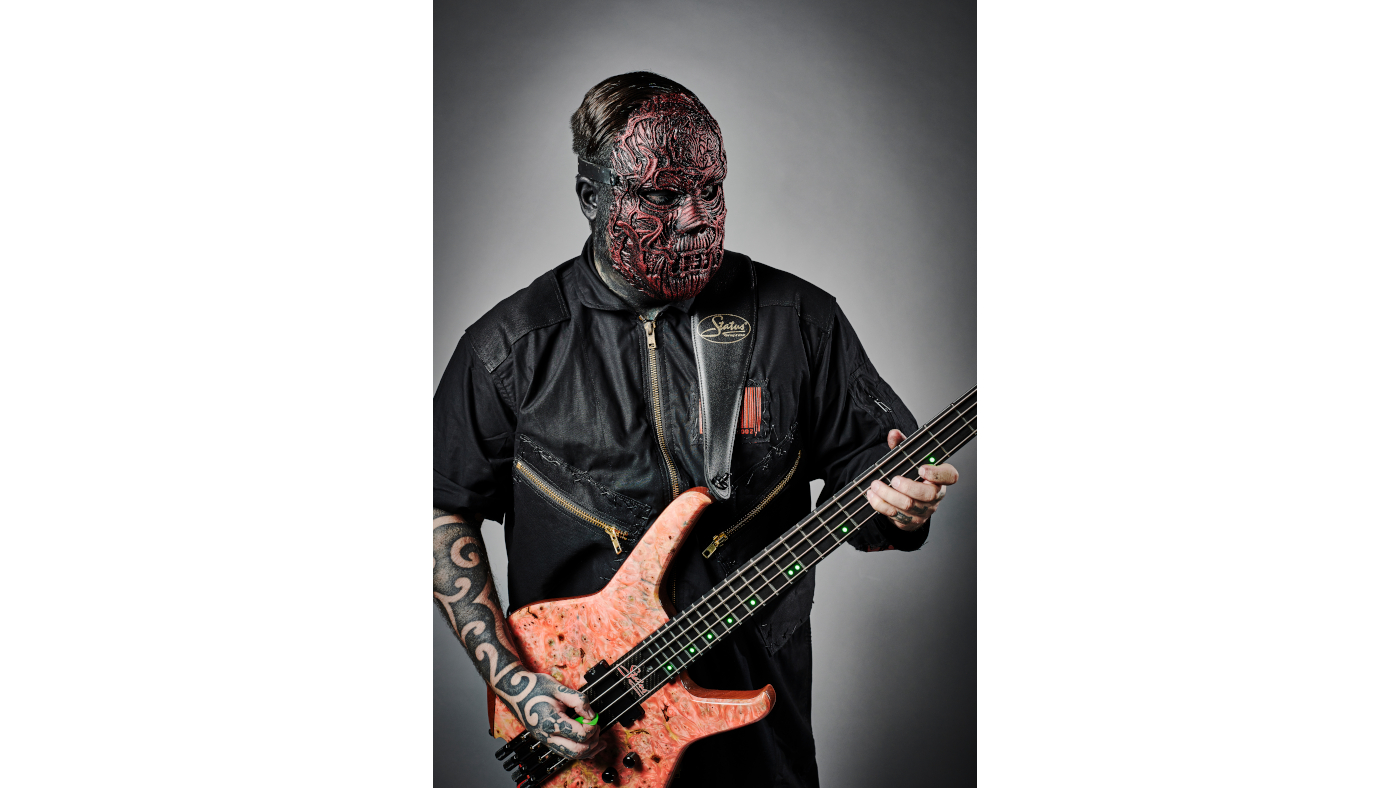
Big rigs
Venturella made his debut with Slipknot on 2014’s .5: The Gray Chapter album – though he admits it’s this year’s return that marks his true introduction into the group’s sonics – and in more ways than one, as he’s built not only his own rig but also live systems for guitarists Jim Root and Mick Thomson.
Before going into specifics, he warns us his setup may be considered, as a great man once sang, a bit overkill...
I know players like Cliff Burton made basic sound great, but I love big rigs. Even when I was playing dingy s***holes, I ran dual heads
“I know my rig is stupidly over-the-top,” he laughs, doubling up on Motörhead references for good measure. “I know players like Cliff Burton made basic sound great, but I love big rigs. Even when I was playing dingy shitholes in the UK as a kid, I ran dual heads and 16U racks. My in-ears sound incredible, so it’s worth it. I’m sure any great player could go through a SansAmp into the desk – but they’ll always sound better if you put a £6000 compressor in front!”
He continues: “As for what I play, Rob and Dawn Green at Status Graphite go above and beyond for me. I don’t get everything for free, it’s not like that. If someone offered me £100 million, sure, I might use something else – but I’ll never stop playing Status basses. I like the stereo trim pot they have. I tracked some of the album with Chris Wolstenholme from Muse’s signature basses, one tuned to A and the other to B. He’s the backbone of that band, and his tone has always been huge. I guess once he tried a vintage S2 with the big block bridges it was a no- brainer! Now his entire rack is pretty much Status, with a few Fenders. I actually used a P-Bass to track overdubs on songs like ‘Spiders’, which needed something rounder.”
From there, coming in via a Shure Axient wireless and Radial JX44 signal manager with its own effects loop, Venturella’s live signal is split four ways – through a Ridge Farm Gas Cooker mic pre, a Darkglass Alpha Omega dual distortion, a Gallien Krueger 2001 RB head and a Diezel Herbert feeding into a Two Notes Live Cab Impulse Response. The front-of-house engineers then find the right blend for the mix, with seemingly no shortage of low- end at their fingertips.
“I was always a Diezel guy when I was playing guitars, then I heard people had put basses through them,” continues Venturella. “I thought, ‘Well, Lemmy used a guitar amp, pretty much!’ so now they’re working on a new bass head for me. The new Darkglass Alpha Omega adds a punch and also has a cab sim, which I changed to an impulse response we did of an 8x10.
"Then the Gallien Krueger is super clean, with Mark King-levels of tightness, you could play a slap gig with it but it still has that mid-switch. There are two stereo trim pots that move through two frequencies at once, like a parametric without the volume boost. The kick drum gets lost with the bass in a lot of metal – this narrows the frequency range so the mids sit on top of the kick.”
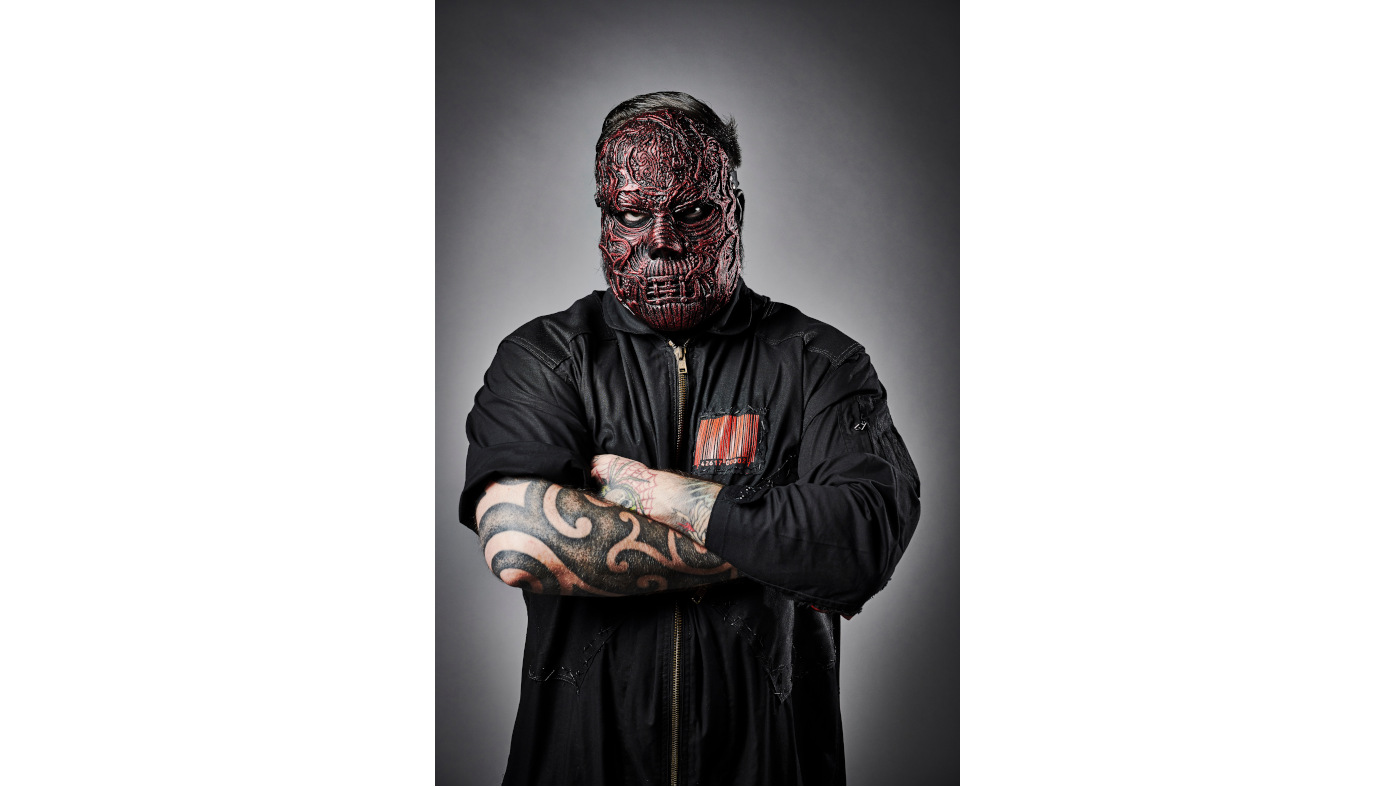
Although he describes his sound as fairly clean overall, it’s the coupling of warmth from the Ridge Farm with the slightly overdriven mids from the Darkglass, and more from a Stone Deaf Fig Fumb fuzz where required, which gives it that ‘clack’. Being more of classical-style musician in terms of ethics – studious and learned, as fans of 80s guitar hero Yngwie Malmsteen often tend to be – Venturella examined the prior recordings of original ’Knot bassist Paul Gray, who passed away in 2010, in an effort to “delve deep into what he did and the tonality of what was happening.”
He says that his role early on in the band was to “fill a great man’s shoes and do him justice” – it wasn’t about replacing the irreplaceable. “My approach isn’t the same as Paul’s. I can’t be him and never will be, every player is ultimately born different. That said, if you listen to Paul’s note choices on Vermilion, he was all over the shop and it sounded great. I wanted to try things like that.
My approach isn’t the same as Paul’s. I can’t be him and never will be, every player is ultimately born different
“After listening to his stems, I honestly looked at bass in a different light and understood how to support everything as the backbone. Take the bass out of the mix and everything will fall flat on its arse – and equally, if you mix too bass-heavy, you’re not going to get your point across either. Lead guitarists, on the other hand, always need to cut through because that’s what the job entails. As the rhythm section, we’re there to hold the fort.”
It’s this kind of attitude that has seen VMan’s role grow respectfully and organically. While their last album cycle witnessed the group in a state of transition, with a new rhythm section for the very first time in their recording career, We Are Not Your Kind ushers an exciting new step in the evolution of Slipknot and the bassist’s contributions within their ranks.
“It’s my second album, writing with them too this time, as well playing piano and synthesiser,” explains VMan, citing Nero Forte as the song on which he’s most proud of his input.
“I really wanted to add a lot of effects to the overall soundscape, which is why I used an Eventide H9 with loads of presets that I tweaked. They just brought out a two-unit beast called the H9000. Again, it’s a bit overkill, but it has this amazing Grunge Compressor algorithm.
“Our front-of-house guy loved it, he said the bass suddenly just cut through – which is what you need on songs like Duality, where you hit one note to smack people in the face. It also has this ethereal effect called Crystals, a wah for half-cocked sounds and another algorithm called Black Hole which sounds like something from Interstellar... it’s pretty much Hans Zimmer in a box! These all get used in little spots throughout the set, to avoid being just another standard metal player.”
The past five years have seen Venturella embrace bass as his primary instrument, vowing to himself early on that he wouldn’t be just another guitar player bluffing his way through the lower register. If anything, he now feels that the balance has slid the other way – joking about the side-effect of applying too much pressure when he switches back to six-strings, which feel almost flimsy and dainty by comparison.
“I use a pick in Slipknot,” says Venturella, noting that he recently changed from a .7 triangle to a .88 for more surface area purchase and bite to feed those compressors. “I did try playing with my fingers, but it just didn’t sound as good. I’m sorry – I don’t care what anyone says or how good you are – if you’re going to play fast triplets and lock in on those syncopations, a pick rounds off your tone and matches the guitar punch. But at home, I rarely use a pick on bass. I’ve been really trying to build my chops, moving more into slap techniques. It’s a different instrument to me now than when I joined. I’ll watch someone like [British session maestro] Bill Banwell, listen to how he plays and learn from that kind of response. Even if you’re playing metal, you can bring some slickness to what you do.”
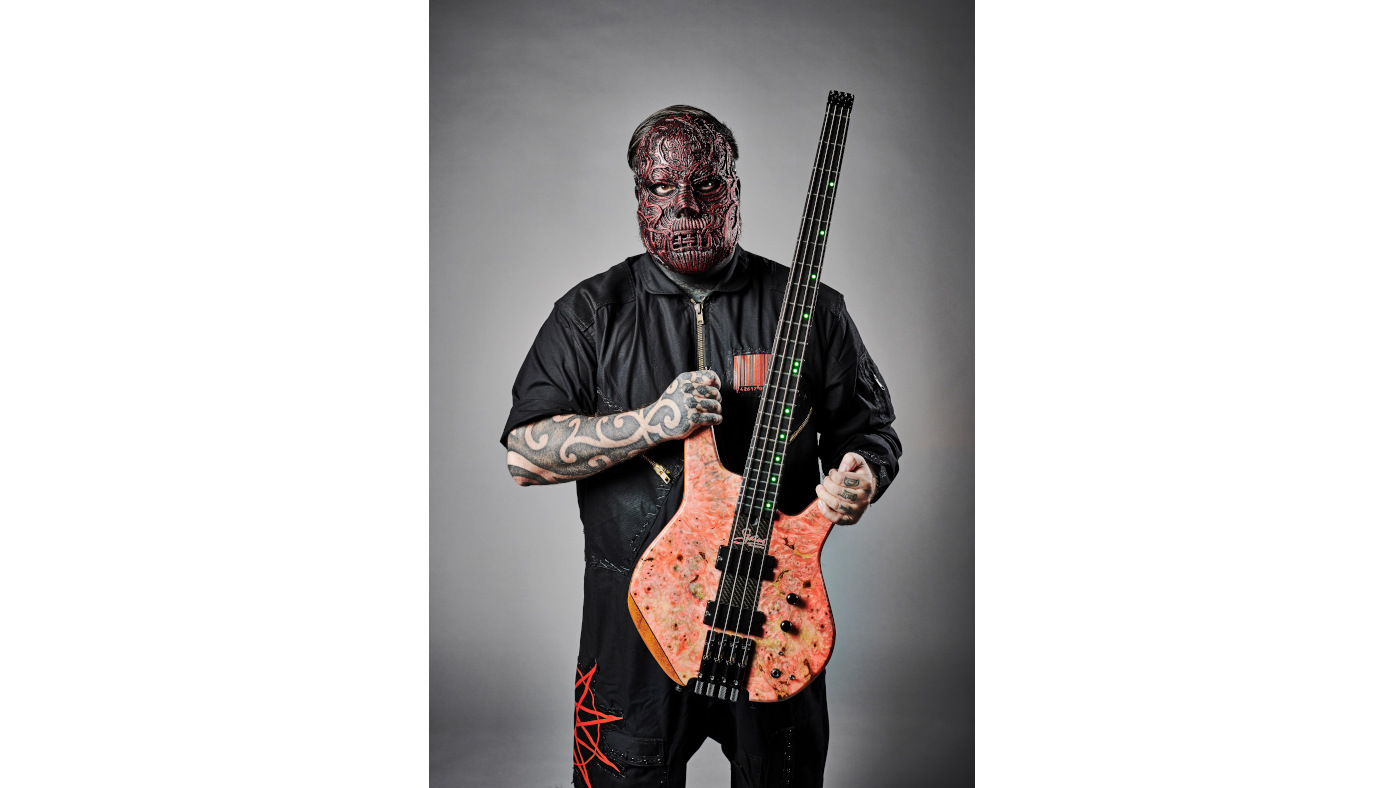
V Unit
Asked about the tones that influenced him growing up, the Slipknot bassist cites Les Claypool, Justin Chancellor and Jason Newsted as masters of the “big punchy bass tones I like to hear” and looks to Gojira and Meshuggah for inspiration in technique – describing that specific approach as “more like a machine gun”. He also namechecks Mark King and Stanley Clarke as two broader heroes who are virtually unrivalled in terms of sheer control. In many ways, a similar sense of discipline has been key to surviving his band’s two hour-long processions of fret-burning intensity night after night.
Everyone in this band is sounding incredibly tight right now. Together, we’re a real unit
“Having all that stuff on [mask and overalls] and running around isn’t easy – our set can be a bit of a deathtrap!” Venturella admits, recalling the events of August 4, 2015 where he was rushed to hospital mid-show. “There was one night where I fainted because I’d stopped eating carbs and was only drinking coconut water, which gave me severe dehydration...
“I won’t be doing that again! I curled up into a ball, my eyes were spinning in their sockets. In this band, there’s a lot going on around you aside from all the sneaky little pre-bends and rhythms. So you need to know exactly what note you’re aiming for and anticipate all the time changes. That’s what makes Slipknot so unique, those little mannerisms and intricacies that have this collective nuance when it’s all played together.”
In the hours leading up to the main event, Venturella still favours the old John Petrucci exercises he learned on guitar as a teenager, moving up chromatically fret-by-fret through each string up and down the neck. Though it’s been a somewhat more uncomfortable, if not painful, experience doing these on longer-scale instruments, the rewards have been fruitful.
“Playing what we do, you can easily blow your right hand out,” he says. “You need that practice and control in order to keep it focused. I’ve made a load of backing tracks to hone in on techniques like metric modulation, which I then keep speeding up, purposefully making it harder for myself in order to get better. And I can hear the difference... honestly, everyone in this band is sounding incredibly tight right now. Together, we’re a real unit.”
Two weeks later, when Slipknot bring an unforgettable carnival of heaviness to the main stage of Download Festival, sounding more explosive than ever, his words echo loud and clear. V is for victory.
We Are Not Your Kind is out now on Roadrunner.
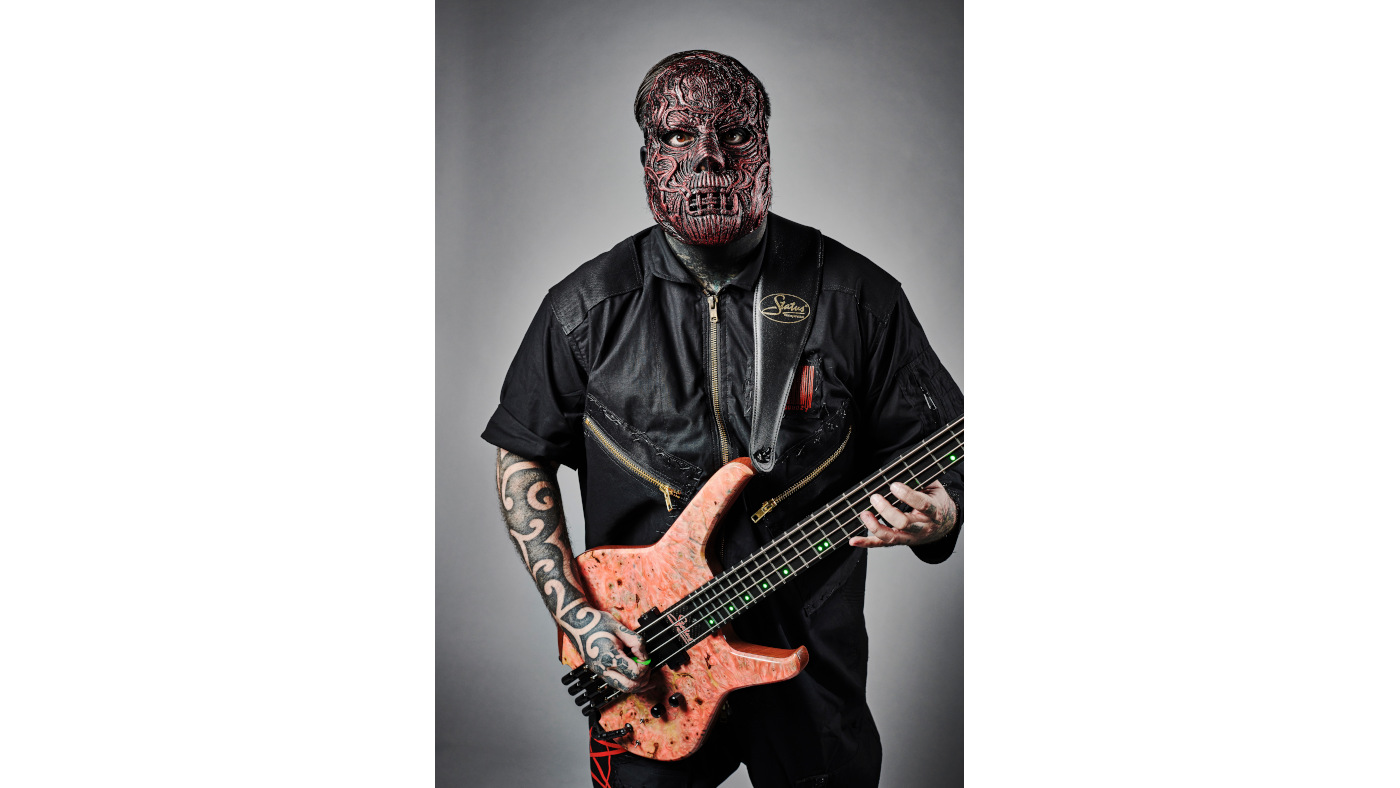


Amit has been writing for titles like Total Guitar, MusicRadar and Guitar World for over a decade and counts Richie Kotzen, Guthrie Govan and Jeff Beck among his primary influences. He's interviewed everyone from Ozzy Osbourne and Lemmy to Slash and Jimmy Page, and once even traded solos with a member of Slayer on a track released internationally. As a session guitarist, he's played alongside members of Judas Priest and Uriah Heep in London ensemble Metalworks, as well as handling lead guitars for legends like Glen Matlock (Sex Pistols, The Faces) and Stu Hamm (Steve Vai, Joe Satriani, G3).
“I can write anything... Just tell me what you want. You want death metal in C? Okay, here it is. A little country and western? Reggae, blues, whatever”: Yngwie Malmsteen on classical epiphanies, modern art and why he embraces the cliff edge
“You're by far the best guy that we've tried. I would love to have you in the band”: So why did Trent Reznor turn down Richie Kotzen for Nine Inch Nails?










